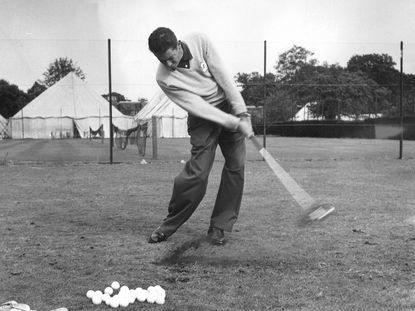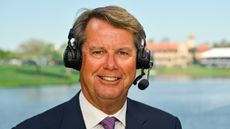Cary Middlecoff – Profile of a golfing legend
Blessed with one of the game's most graceful swings, Cary Middlecoff is rightly remembered as one of golf's greats

Gavin Newsham looks back on the life and career of one of the game's true greats, three-time Major winner Cary Middlecoff
Greatness, in any walk of life, is a curious notion. Sure, we can all name the ‘great’ players in golf. But it’s how they’ve gone about it that’s perhaps most intriguing.
Men like Jack Nicklaus and Tiger Woods demanded respect not so much for their personalities but for their hugely impressive track records in the game. Others, like Seve Ballesteros, managed to do it with guile, verve and bucketloads of charisma.
Quite where that leaves Dr Emmett Cary Middlecoff, then, is open to question. During his career, the tall Tennessean won the same number of Majors (three) as Vijay Singh, Payne Stewart and Nick Price, and more than Ben Crenshaw, Bernhard Langer and Johnny Miller.
He bagged 40 wins on the PGA Tour which, for the record, is more than Gene Sarazen and Tom Watson and double the total of Greg Norman and Ernie Els combined, and in the 1950s he won more PGA Tour titles than any other player in the decade. And yet you’d still struggle to pick his face out of an identity parade.
LATE STARTER
What made Cary Middlecoff’s rise to the elite ranks of professional golf all the more remarkable was that he didn’t join the PGA Tour until he was 26. Prior to that, he had made a living as a dentist, just like his father and his two uncles. It was a profession that later earned him the nickname ‘Doc’ when he did join the Tour.
Get the Golf Monthly Newsletter
Subscribe to the Golf Monthly newsletter to stay up to date with all the latest tour news, equipment news, reviews, head-to-heads and buyer’s guides from our team of experienced experts.
Born in Halls, Tennessee, it was his dad, Herman Middlecoff, who had taught the seven-year-old Cary how to play the game. Such was his desire to improve, Cary Middlecoff soon became known locally as ‘The Ghost’ because of his predilection for haunting all of the area’s clubs, looking for a game or just some advice.
It paid off. Aged 17, he took the Memphis City Championship. But it was during his student days, first at the University of Mississippi and later at the University of Tennessee’s College of Dentistry, that Cary Middlecoff’s undoubted talent really began to shine through.
In 1944, with his dental degree completed, Cary Middlecoff was conscripted into the US Army Dental Corps for the Second World War. When he was discharged in 1946 he joined his father’s dental practice but within a year he was playing the game full-time, pledging to give himself two years to make it before he returned to dentistry.
KING OF SWINGS
Certainly, Middlecoff’s swing was something special. Long, languid and with a little pause at the top, he could propel the ball distances few other players of the era could compete with.
He also possessed determination and resilience in spades, as his record-breaking 11-hole sudden-death play-off with Lloyd Mangrum at the 1949 Motor City Open proved. It was such a titanic tussle that the organisers eventually just called it off and the pair shared the title.
But Middlecoff also had a quick temper that was at odds with his affable nature off the golf course. During the third round of the 1953 US Open at Oakmont, he had dunked his ball into a greenside bunker on the 10th but rather than try to get up and down, he simply opened his shoulders and smashed his ball onto the nearby Pennsylvania Turnpike instead and then stormed off.
Still, victory at the 1955 Masters finally persuaded Middlecoff Snr to take his son’s name off the door of his dental surgery. But it was also the victory that established Middlecoff as the pre-eminent player of the decade and when he went on to win his third major title, taking his second US Open at Rochester’s Oak Hill Country Club the following year.
DRIFTING AWAY
But another Major never came his way as his game slowly began to desert him as problems with his back (he had been born with an extra lumbar vertebrae) and strange, sudden attacks of nerves took their toll.
Often, this would manifest itself in some fidgety, frustrating and chronically slow play, leading one golf writer to suggest that the reason Middlecoff had given up dentristy was because “no patient could keep his mouth open that long.”
It wasn’t his only problem. Middlecoff also had to contend with a long-standing problem with his left eye. During his time in the military, he had been hit in the eye by a piece of Carborundum that had come away from a disc he was using in an operation, leaving the eye ulcerated.
Then there was the hay fever, an affliction that only flared up at the height of his powers in 1955. “One of the main reasons I took a lot of time over the ball was that I couldn’t see very well,” Middlecoff would explain. “The hay fever was part of it, and the problem with the left eye was also a factor.”
END OF THE ROAD
Cary Middlecoff would only win three more times on Tour until he retired from the game in 1961, playing his last tournament in front of his hometown fans in Mississippi while still in his early 40’s.
It was unfair, however, that many were now talking about his temperament rather than his terrific talent. “I don't deny I'm nervous,” he would explain. “[But] I have always maintained that a man who is not nervous is either an idiot or has never been close enough to winning to get nervous.”
With his competitive playing days over, Middlecoff turned his attentions to publishing, authoring several acclaimed tuition books, most notably 1974’s The Golf Swing (you can still get it online, by the way) and also to television where he worked as an analyst for CBS for 14 years.
In 1986, when he was rightly inducted into the World Golf Hall of Fame, the supporting statement described the pace of his play, somewhat euphemistically, as ‘glacial’ before adding that Middlecoff was “one of the few players ever to master the game young and then never loose his grip on it.”
-
 Former NFL Star Tony Romo Reveals 'Insane' Scottie Scheffler Stat After Playing 500 Rounds With World No.1
Former NFL Star Tony Romo Reveals 'Insane' Scottie Scheffler Stat After Playing 500 Rounds With World No.1Tony Romo spoke highly of his good friend Scottie Scheffler, comparing him to Tiger Woods and Jack Nicklaus
By Joel Kulasingham Published
-
 'I Think He'll Be Great' - Paul Azinger Reveals Early Scottie Scheffler Prediction
'I Think He'll Be Great' - Paul Azinger Reveals Early Scottie Scheffler PredictionThe former NBC Sports lead analyst has explained how he saw greatness in Scottie Scheffler years before he began to dominate
By Mike Hall Published